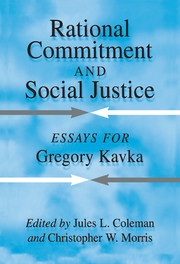Book contents
- Frontmatter
- Contents
- Acknowledgments
- List of Contributors
- Introduction: The Moral and Political Philosophy of Gregory Kavka
- Some Personal Memories
- The Shadow of the Future
- A New Paradox of Deterrence
- Rethinking the Toxin Puzzle
- Toxin, Temptation, and the Stability of Intention
- The Toxin Puzzle
- Religion and Morality in Hobbes
- Contemporary Uses of Hobbes's Political Philosophy
- The Knavish Humean
- Some Considerations in Favor of Contractualism
- Justice, Reasons, and Moral Standing
- Wrongful Life: Paradoxes in the Morality of Causing People to Exist
- Gregory S. Kavka's Writings
Contemporary Uses of Hobbes's Political Philosophy
Published online by Cambridge University Press: 28 October 2009
- Frontmatter
- Contents
- Acknowledgments
- List of Contributors
- Introduction: The Moral and Political Philosophy of Gregory Kavka
- Some Personal Memories
- The Shadow of the Future
- A New Paradox of Deterrence
- Rethinking the Toxin Puzzle
- Toxin, Temptation, and the Stability of Intention
- The Toxin Puzzle
- Religion and Morality in Hobbes
- Contemporary Uses of Hobbes's Political Philosophy
- The Knavish Humean
- Some Considerations in Favor of Contractualism
- Justice, Reasons, and Moral Standing
- Wrongful Life: Paradoxes in the Morality of Causing People to Exist
- Gregory S. Kavka's Writings
Summary
Aristotle thought that the best sort of human life would have to include friendships, for the reason, among others, that engaging in common activities with our friends helps us to sustain a livelier and more continuously active interest in those projects that give meaning and substance to our lives. John Cooper points out that we need not be officially collaborating with friends in order to reap this benefit of friendship; when, for instance, as philosophers we work on the same problem as our friend and view our individual works as contributions to solving the problem we share, we enjoy the goods of friendship Aristotle is describing.
Those who find this Aristotelian claim plausible will understand why I have been alarmed by the state in which Gregory Kavka and I were forced to leave our Hobbes dispute. After years of wrangling over the content of Hobbes's political theory, he had just come to a conclusion he expressed this way: “Well, Sharon, you're probably right about the historical Hobbes. But my Hobbes is more interesting!” Now, this pronouncement could describe a satisfactory state of affairs only if one supposes us engaged in two quite different projects – mine to uncover the actual Hobbes, in the way that interests the intellectual historian, and Kavka's to construct a philosophically interesting and useful Hobbes, in the way that interests the political philosopher. These would be parallel projects, not unrelated perhaps, but also not the joint enterprise of friends.
- Type
- Chapter
- Information
- Rational Commitment and Social JusticeEssays for Gregory Kavka, pp. 122 - 149Publisher: Cambridge University PressPrint publication year: 1998
- 2
- Cited by



